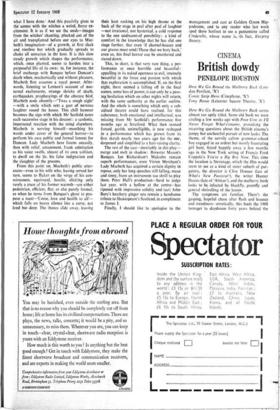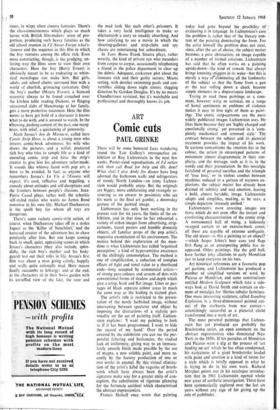CINEMA
British dowdy
PENELOPE HOUSTON
Here We Go Round the Mulberry Bush (Lon- don Pavilion, 'X')
Comic Strip Hero (Cinephone, 'X')
Tony Rome (Leicester Square Theatre, 'X') -Here We Go Round the Mulberry Bush seems almost too aptly titled. Same old bush we were circling a few weeks ago with Poor Cow or I'll Never Forget Whars'isname, provoking the recurring questions about the British cinema's jumpy but uncheerful pursuit of new looks. The theme, of the nervily callow grammar-school boy engaged in an ardent but mostly frustrating girl hunt, fizzed happily away a few months ago in the New York setting of Francis Ford Coppola's You're a Big Boy Now. This time the location is Stevenage, which the film would- seem to see as a kind of outer suburb of pur- gatory, the director is Clive Donner (late of What's New Pussycat?), the writer Hunter Davies (late of 'Atticus'), and the mulberry bush looks to be infected by blackfly, greenfly and general shrivelling of the leaves.
The symptoms are familiar. There's the gasping, hopeful chase after flash and bounce and trendiness—erratically, this leads the 1968 teenager to daydream forty years behind the
times, in wispy silent cinema fantasies. There's the class-consciousness which plays so much havoc with British film-makers' sense of pro- portion, producing such heavy fatuities as the old school reunion in I'll Never Forget what's- 'isname and the sequence in this film in which the boy ventures among the effete rich. Even more constricting, though, is the grudging, un- loving way the films seem to view their own characters. Here the boy (Barry Evans) is obviously meant to be as endearing as whim- sical monologue can make him. But girls, adults and School chums surround him with a world of churlish, grimacing caricature. Only the boy's mother (Moyra Fraser), -a licensed eccentric always to be found crouched over the kitchen table reading Dickens, or flinging occasional slabs of blancmange at her family, gets a more protective treatment. Here the film seems to have got hold of a character it knows What to do with, and is amused to watch. In the elbowing, pushing context of the past, one recog- nises, with relief, a quickening of generosity.
Alain Jessua's feu de Massacre, called here Comic Strip Hero, is about a young man who invents comic-book adventures, his wife who draws the pictures, and a wilful, protected rich boy who tries to sample life as a kind of unending comic strip and hires the strip's creator to give him his adventure tailor-made. It sounds like whimsy laced with pop art; a brew to be avoided. In fact, as anyone who remembers Jessua's Lit Vie a l'Envers will expect, it's cool, reflective and beguiling, a comedy about attitudes and self-deceptions and the frontiers between people's illusions. Jean- Pierre Cassel plays, rather well, the sybaritic self-styled realist who wants no James Bond nonsense in his own life; Michael Duchaussoy is the spoilt boy for whom all toys are dangerous.
There's some rackety comic-strip action, of course, when Duchaussoy takes off in a stolen Jaguar as the 'Killer of Neuchatel,' and the harassed creator of the adventure has to chase petulantly after him. But one keeps coming back to small, quiet, appraising scenes in which Jessua's characters (they also include, splen- didly, the rich boy's mother and his body- guard) test out their roles in life. Jessua's first film was about a man going calmly, happily and really quite rationplly mad. Here reason finally succumbs to lethargy; and at the end, as the characters sit in their Swiss garden with its unruffled view of the lake, the sane and
the mad look like each other's prisoners. It takes a very lucid intelligence to make so dilettanteish a story so steadily absorbing. And how satisfying to see a movie in which the shooting-galleries and strip-clubs and spy chases are entertaining but subordinate.
In Tony Rome Frank Sinatra plays, rather wearily, the kind of private eye who meanders from corpse to corpse, occasionally telephoning a friend in the police department to clear up the debris. Adequate, corkscrew plot about the insecure rich and their guilty secrets; Miami setting, with derelict swimming pools and con- vertibles sliding down night streets; slugging direction by Gordon Douglas. It's by no means Chandlertown revisited, but it's watchable and professional and thoroughly knows its job.































 Previous page
Previous page